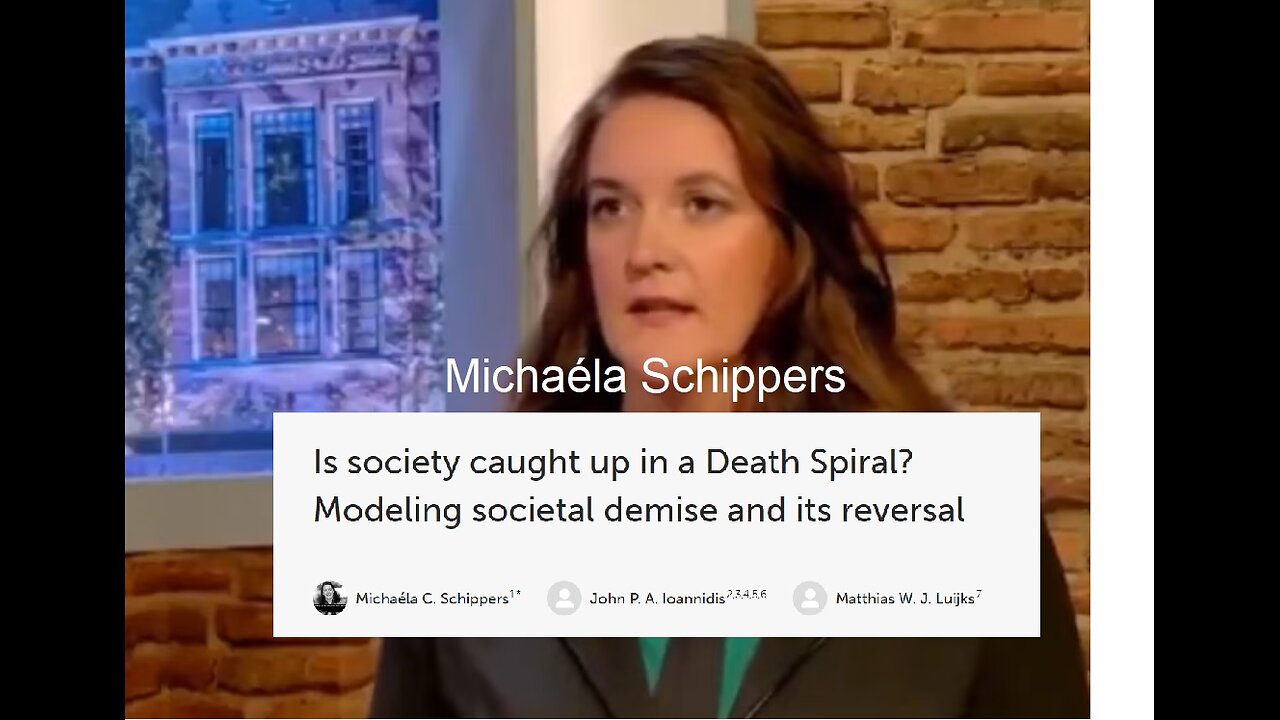Premium Only Content

Michaéla Schippers,"Is Society Caught Up in a Death Spiral?
Michaéla Schippers,"Is Society Caught Up in a Death Spiral?
In "Is Society Caught Up in a Death Spiral? Modeling Societal Demise and Its Reversal," Dr. Michaéla Schippers, alongside John P. A. Ioannidis and Matthias W. J. Luijks, delivers a piercing analysis of our current societal trajectory, particularly in the aftermath of the COVID-19 pandemic. The paper isn't just theoretical; it's a stark diagnosis of what the authors identify as a perilous downward spiral gripping our world.
The heart of their argument is the "Death Spiral Effect," a model that illustrates how societies can spiral into decline when crises like the pandemic are met with poorly managed responses. Dr. Schippers highlights how the initial reactions—lockdowns, school closures, and broad restrictions—did more harm than good. "Hunger has doubled since 2020," she states, pointing to the dire consequences of these measures.
The "Death Spiral Effect" shows how panic-driven decisions lead to a series of escalating negative outcomes, such as increasing inequality, loss of freedoms, and a deepening mistrust in institutions. Dr. Schippers vividly describes this process: "We are running around like ants," she says, underscoring the chaotic and uncontrolled nature of this societal decline.
A key factor in this spiral is the phenomenon of groupthink, where societal pressures enforce conformity and suppress dissent. "Pressure to conform has become the norm," Dr. Schippers warns, emphasizing how this stifling environment has led to a myopic focus on specific outcomes, often at the expense of long-term consequences.
Despite the grim situation, Dr. Schippers and her co-authors offer a way forward. They advocate for "turnaround leadership"—leaders who are committed to reassessing and altering the course of society based on a broader understanding of the situation. "We need leaders who are not in it for themselves," Dr. Schippers insists, calling for selfless leadership as a key to reversing the downward spiral.
The paper challenges readers to recognize the signs of societal collapse and to act before it becomes irreversible. Dr. Schippers urges a collective effort to "break the downward spiral" and to restore trust, reduce inequalities, and build a society where people can thrive. She believes that through open-mindedness, genuine leadership, and a collective commitment to change, it is possible to reverse the current trajectory and create a more resilient and prosperous society.
-
 1:02:45
1:02:45
Game On!
18 hours ago $2.56 earnedFootball is BACK! NFL Hall of Fame Game 2025
17.3K2 -

FusedAegisTV
23 hours ago3rd Party Partner Showcase Nintendo Direct! REACTION 7.31.2025 | FusedAegis Presents
13.2K -
 13:30
13:30
WhaddoYouMeme
17 hours ago $3.66 earnedIt All Makes Sense Now
20.5K23 -
 2:00:05
2:00:05
Nick Freitas
16 hours agoIs Conservatism Dead?
22.8K23 -
 LIVE
LIVE
PudgeTV
9 hours ago🟠 Gaming on Rumble | Frostpunk 2 - Completing Chapter 2
99 watching -
 22:07
22:07
Jasmin Laine
18 hours ago'You Think This Is NORMAL?!'—U.S. Official STUNS CTV With BRUTAL Mic Drop
22.3K39 -
 2:00:40
2:00:40
BEK TV
1 day agoTrent Loos in the Morning - 7/31/2025
18.2K1 -
 LIVE
LIVE
The Bubba Army
23 hours agoShannon Sharpe FIRED after Sex Lawsuit - Bubba the Love Sponge® Show | 7/31/25
1,330 watching -
 21:23
21:23
DeVory Darkins
1 day ago $10.51 earnedTrump makes STUNNING Admission regarding Epstein and WSJ settlement
37K108 -
 8:14
8:14
MattMorseTV
18 hours ago $7.73 earnedTrump just DROPPED the HAMMER.
44K45